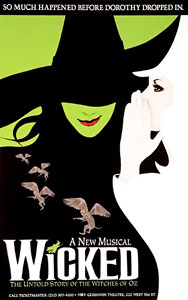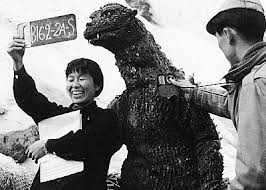Oz Four Ways: Wicked, The Musical
 From the Travel Guide: See and hear the Merry Old Land at its very best in our carefree Musical Tour of Oz! Young and old alike will revel in a colorful roller-coaster ride of sight and sound. Our most distinguished citizens are waiting to welcome you and even offer a few surprises! You’ll laugh, you’ll cry, you’ll gasp in wonder and shiver in terror, but by tour’s end, you’ll feel warm and tingly all over, ready to visit again and again! This is our most popular tour, so get your tickets now for the experience of a lifetime!
From the Travel Guide: See and hear the Merry Old Land at its very best in our carefree Musical Tour of Oz! Young and old alike will revel in a colorful roller-coaster ride of sight and sound. Our most distinguished citizens are waiting to welcome you and even offer a few surprises! You’ll laugh, you’ll cry, you’ll gasp in wonder and shiver in terror, but by tour’s end, you’ll feel warm and tingly all over, ready to visit again and again! This is our most popular tour, so get your tickets now for the experience of a lifetime!
We’ve spent much time here at SF debating how well some of our favorite stories have fared in translation from book to movie. Though there’s usually an overarching respect for the source material, some scenes and dialogue of greater or lesser importance may be adjusted or omitted for the sake of dramatic effect or other demands of the new medium. Some of these changes may bring the original to more vivid life or introduce new ideas that harmonize with the author’s vision. Other innovations, like green fog, or a certain boy king smooching a certain girl queen, are perhaps best forgotten. Ahem.
The Broadway stage musical is an odd bird and a distinctively American species. The medium frequently becomes the message, and a beloved work of fiction or film may find itself contorted beyond all recognition to yield not a faithful adaptation or affectionate tribute, but a story that fits the Broadway formula—big, bold, brassy, and loud, the story “as it should have been told.”
Full disclosure time: I’ve not seen the musical in its entirety. My comments here are based on the soundtrack, a plot synopsis, and video clips of the major production numbers, and I’ll try to avoid drawing unreasonable conclusions beyond my source material. Further illumination from anyone who has seen the whole thing is welcome. I recommend reviewing my post from last week as a point of reference for discussing this version.
Where Wicked: The Life and Times of the Wicked Witch of the West is content to explain Elphaba’s tortured life and tragic end, Wicked the Musical is more about rehabilitating her image. She wasn’t really wicked. She was a misunderstood champion of the oppressed who refused to bow to injustice—the misfit girl who dared to fly! There’s an element of this idea in Gregory Maguire’s book, and a brief moment when it’s actually true, but that’s swallowed up in the descent into suicidal self-loathing that consumes the final third of the novel.
The musical’s focus is the odd-couple college roomie friendship arc of Elphaba and Glinda, the future Witches of the West and North, from mutual dislike, to BFFs, to tearful parting of the ways driven by forces beyond their control. Anyone who’s ever had a roommate, college or otherwise, will understand. As a lighthearted piece of fluff, I think it works quite well, but it’s not the story Maguire told. This is a small slice of his novel that’s been inflated into a two-hour-plus Broadway spectacle of music and pageantry. The result is, by all accounts, very entertaining and emotionally moving, thus the critical acclaim, Tony awards, extended run, global tour, etc. Maguire’s personal feelings about this re-visioning are unclear, but he doesn’t seem to be complaining:
It seems to make perfect sense to me that I should now stand out of the way and let the story even my story go on and develop some grandchildren. I feel like I stand in an avuncular, grandfatherly relation to the Broadway play. It does do some things to the story that I wouldn’t have done myself, and that I didn’t do myself — that I actually considered and rejected — but that’s not to say that I disapprove of them. I recognize that it’s another generation, and in the next generation down there will be new characteristics. It’s not a clone; it’s something else.
Most of the grit has been swept from the source material, which makes it more family-friendly and perhaps in that respect brings it back in line with the intent of L. Frank Baum’s original, but there’s also no serious examination of the nature of evil or the power of good over evil. There’s some expansion of the relationship between Elphaba and her sister, Nessarose (who is crippled and unable to walk, rather than armless), and more conflict between them, mostly Nessarose’s fault. A couple of love triangles are added, which cause their own complications, but also provide some explanation for a few loose ends the novel leaves untied.
The primary evil remaining in Oz is prejudice, fomented by the Wizard and his hangers-on. Thus, “wicked” is a label bad people stick on people who are different from themselves. “Good” is a label bad people stick on themselves to cover their hypocrisy. This isn’t to say that some things aren’t genuinely good, like making friends and being kind to animals, and a sub-theme of this story is the characters’ struggle to be good, even in the midst of their confusion about what that really means. As for power, the persistent, if unoriginal, message is that it’s the power inside each of us that matters. One determined person can do anything.
Here’s a quick dash through some of Wicked’s high points, via YouTube. It’s certainly not fair to judge the merits or demerits of the entire product via a series of clips taken out of context, but I think a conversation about this sort of entertainment has to include a look at how story, actors, music, lyrics, costume, and set design merge into a single multimedia voice.
No One Mourns the Wicked. As the curtain opens, the denizens of Oz are celebrating the Witch’s demise and giving testimony to her wickedness. Then we’re hurled into a flashback…flashback…flashback to witness how all this came about.
Popular. The whole annoying-college-roommate thing blossoming into friendship is fun. It’s one reason I originally bought the book for my wife before I was aware that the novel and the musical bore little similarity. Ouch. I’m glad I read the book before she did. She has some wonderful, funny, and horrifying roommate stories from her own college days that probably deserve a book of their own.
I’m Not That Girl. I read somewhere that most Broadway musicals include a solo number near the beginning in which the heroine/hero bares their soul to the audience, with the intent of inspiring us to fall in love with them. It can make or break the entire production. You probably remember songs like “Tomorrow,” from Annie, or “The Impossible Dream,” from Man of La Mancha, or “My Favorite Things,” from The Sound of Music. Here’s Elphaba’s. This video offers a montage of images from the play.
Defying Gravity. And sticking it to ‘the man.’ This is Wicked’s anthem, and it’s powerful, if a bit reminiscent of Invictus (the poem, not the movie). Any audience that isn’t moved to respond with a standing ovation at its end is advised to inquire of the Wizard about a heart.
For Good. Elphaba and Glinda part ways while affirming the value of their friendship, even if it must come to an end. A box of tissues is recommended.
The Spoiler to End All Spoilers. People planning to see the musical for the first time and those of delicate constitution should avert their eyes now and scroll below the second ‘zilla if they wish to not have the finale ruined for them.
No, on second thought, I don’t think I’ll spill it. If you can’t bear the suspense, the answer’s here.
Thus ends our tour of Oz, Four Ways. I hope you found one or more of our customized travel plans appealing and helpful. Tipping your tour guide to acknowledge excellent service is always appreciated.































Although I haven’t read the novel, I got to see Wicked in London’s East End–first big musical I’ve ever seen–and I think you got most of the elements down pat. I’m surprised that it’s so different from the book.
My favorite songs are “Defying Gravity” and one you didn’t mention “No Good Deed,” in which Elphaba’s crossing to the Dark Side is explored. In her own words “Sure, I meant well -Well, look at what well-meant did:.” but even more interesting are the lines “Was I really seeking good/Or just seeking attention?/Is that all good deeds are/When looked at with an ice-cold eye?”
In one of my classes we are going over secular philosophies, and this seems an expression of pragmaticism–truth is whatever works. And since Elphaba’s good deeds failed, she goes with wickedness as “what works.”
Thanks, Galadriel, that’s an important scene that I missed. Here’s a link to it from a production in L.A.: http://youtu.be/XJclY5u8xWg